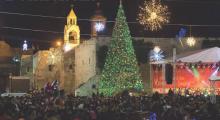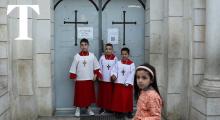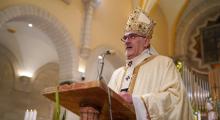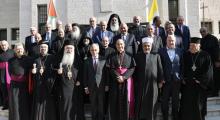Issued by the Catholic Center for Studies and Media - Jordan. Editor-in-chief Fr. Rif'at Bader - موقع أبونا abouna.org
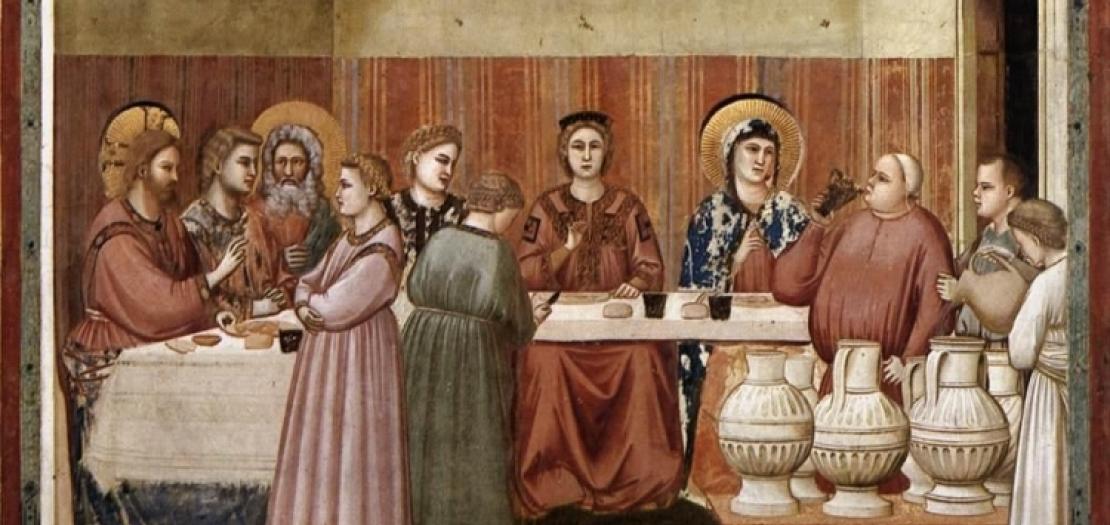
Following is the text of the meditation by Cardinal Pierbattista Pizzaballa, Latin Patriarch of Jerusalem, on the second Sunday of ordinary time C, dated January 19, 2025:
We left Jesus at the Jordan where, hidden among many anonymous people, he received baptism from an unsuspecting John and where his identity was confirmed by the God the Father, who filled him with the Spirit and called him the beloved Son. (Luke 3:21-22)
Today we find Jesus at a wedding, (John 2:1-11) also hidden among all the other participants at the banquet, with nothing to make him appear as a mere guest.
At this banquet, Jesus seems to disappear: He is not one of the protagonists of the feast and He is not the one who notices that there is a shortage of wine; in his dialog with his mother, he seems to say that he cannot do anything yet (“Woman, what concern is that to you and to me? My hour has not yet come” - John 2,4). He has jars filled with water and brought to the master of the table, (John 2:9-10) who does not know where the wine comes from, just as the bride and groom will not know. The disciples are also not explicitly told that they recognized the sign that Jesus performed.
That is the style of God. Everyone rejoices in good and abundant wine, but almost no one knows where this wine comes from, almost no one knows why this life, this joy is so new and so beautiful. In the biblical tradition, wine is a sign of joy and life.
In a way, we are still in the season of Epiphany: this Sunday with the Gospel of the Wedding at Cana, together with the feast of Epiphany and the Baptism of Jesus, forms a single feast, the feast of the God who reveals himself.
Last Sunday we saw that God reveals himself by hiding himself.
Today we see that God reveals himself by intervening in people’s lives without pushing himself too much into the foreground. Simply through his own presence. In this way, He restores the life and the joy that they do not even know they have lost. (“They have no wine” - John 2:3) It is what the prophet Isaiah speaks of in the first reading.
We are indeed at a wedding banquet (Jn 2:1), which reminds us of the eschatological banquet that Isaiah mentions. (Is 25:6-10) It is the most joyful time in the life of a small village, as Cana might have been in Jesus’ time. It was an opportunity for everyone to be together, eating and drinking in a way that could rarely be done.
Now, right at this moment, at the height of the feast, the wine runs out without anyone noticing. That’s the drama: no one notices that they can no longer rejoice, that they can no longer celebrate, that the joy of life has gone out (“they have no wine”).
Mary notices, because this is the vocation of those who have begun to listen in her life (“His mother treasured all these things in her heart” - Lk 2,51): To see life with God’s eyes, to recognize more deeply the pain and lack of the men and women of her time.
Mary thus becomes attentive, (John 2:3) but she does not go to the bride and bridegroom or to the master of the table, as would have been more logical. She does not look for temporary solutions, but goes to the source of the life and of the joy, which is there, hidden among the guests. She knows that when He is present, exactly where everything seems to be over, there can be a new, true beginning.
It is not for nothing that the evangelist John says in v. 11 that this was the beginning of the signs that Jesus performed (“Jesus did this, the first of his signs, in Cana of Galilee, and revealed his glory; and his disciples believed in him”). Jesus is a new beginning. He is the beginning of the signs that will bring joy and life again to those who are without hope.
However, this beginning is not automatic, and Mary knows this very well: this is why she shows the servants the way to enter into a process of rebirth. (“Do whatever He tells you” - Jn 2:5) It is about daring to make a gesture of trust, of confidence, perhaps even without understanding everything. Above all, it is about beginning to listen, because this listening to the Word of God is the true celebration of every human being.
So, when the Lord makes himself known, nothing seems to change: no conspicuous signs, no astonishing manifestations. Simply that life begins to flow again. It flows from a Word that resonates again and that we heard last Sunday, the true Word of the feast: “You are my Son, the Beloved; with you I am well pleased.” (Luke 3:22)
This Word is the wedding banquet to which the Lord invites us, and which can add new flavor to every day of life.
+ Pierbattista


